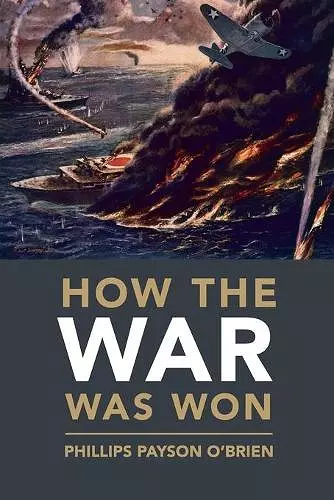How the War Was Won
Air-Sea Power and Allied Victory in World War II
Phillips Payson O'Brien author
Format:Paperback
Publisher:Cambridge University Press
Published:31st Jan '19
Should be back in stock very soon

An important new history of air and sea power in World War II and its decisive role in Allied victory.
This book challenges the view that World War II was decided by land battles. It argues that victory was due to the production and allocation of American and British air and sea weaponry that was used to destroy over half of the Axis's equipment before it reached the traditional 'battlefield'.World War II is usually seen as a titanic land battle, decided by mass armies, most importantly those on the Eastern Front. Phillips Payson O'Brien shows us the war in a completely different light. In this compelling new history of the Allied path to victory, he argues that in terms of production, technology and economic power, the war was far more a contest of air and sea than of land supremacy. He shows how the Allies developed a predominance of air and sea power which put unbearable pressure on Germany and Japan's entire war-fighting machine from Europe and the Mediterranean to the Pacific. Air and sea power dramatically expanded the area of battle and allowed the Allies to destroy over half of the Axis' equipment before it had even reached the traditional 'battlefield'. Battles such as El Alamein, Stalingrad and Kursk did not win World War II; air and sea power did.
'It has become the conventional wisdom that the Soviet Union won the Second World War with only minor contributions from the United States and Great Britain. Phillips Payson O'Brien has written a superb rejoinder to such nonsense in a work that represents a major contribution to our understanding of that terrible conflict. It needs to be read by anyone interested in World War II.' Williamson Murray, author of A War to Be Won: Fighting the Second World War
'This is a book anyone interested in the Second World War will want to read. It refocuses the story of the war away from the battlefield, to the air and the sea, and also to the transit depot, the maintenance facility, the training base. This is an imaginative, cliché-busting work which lays bare exactly when, how and where the Axis lost the war.' David Edgerton, author of Britain's War Machine: Weapons, Resources and Experts in the Second World War and Warfare State: Britain, 1920–1970
'This extremely serious book attempts to re-evaluate World War II not in terms of great battles … but in terms of production, mobility, and economics. O'Brien argues that victory or defeat in World War II must be seen during preproduction, production, and deployment … The work focuses on equipment, mobility, and détente … Especially for graduate students, professors of military history, and those generally interested in the history of Europe or the Far East. Summing up: essential.' R. Higham, Choice
'A novel, provocative, and well-written study based on extensive documentary sources on both sides of the Atlantic. Its author's conviction that 'the effectiveness of tactical air power over strategic … was the most important lesson of the war, one that remains true to this day' makes the book worth careful reading. With his emphasis on degrading an enemy's 'mobility' (perhaps a nod to Basil H. Liddell Hart's 'indirect approach'?) Phillips Payson O'Brien offers a way forward for those working on 'AirSea Battle', area access, and area denial problems in modern warfare. His work will engage and instruct historians of World War II as well as current military officers, strategists, and decision-makers.' Christopher Rein, Michigan War Studies Review
'Such a thoroughgoing revision of the history of the war will outrage many historians. … This is a brave, important and impressively researched book, and all who have written on the Second World War will have to consider O'Brien's cogent arguments.' A. W. Purdue, The Times Higher Education Supplement
'Phillips Payson O'Brien's book is revisionist history at its best: thoughtful, well grounded in secondary and primary sources, and provocative. It is a mature work, the result of several years of research and reflection. … O'Brien deserves high praise for writing a book that will force scholars to think hard about the nature of World War II and perhaps also about the nature of modern warfare in general.' Talbot C. Imlay, The Journal of Modern History
'… recommended …' Geoffrey Till, The Naval Review
ISBN: 9781108716895
Dimensions: 228mm x 152mm x 35mm
Weight: 950g
654 pages